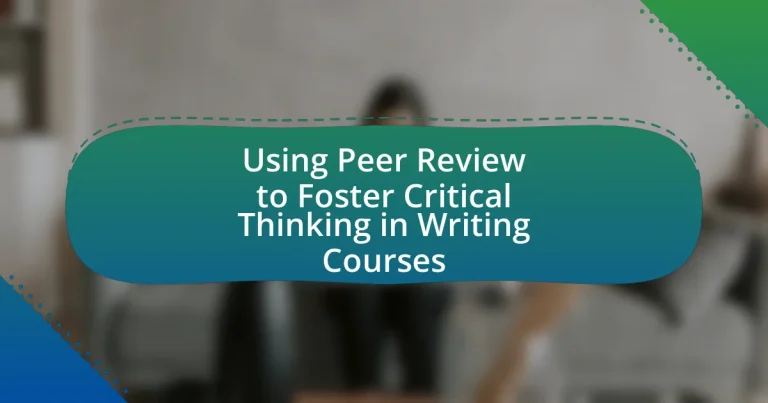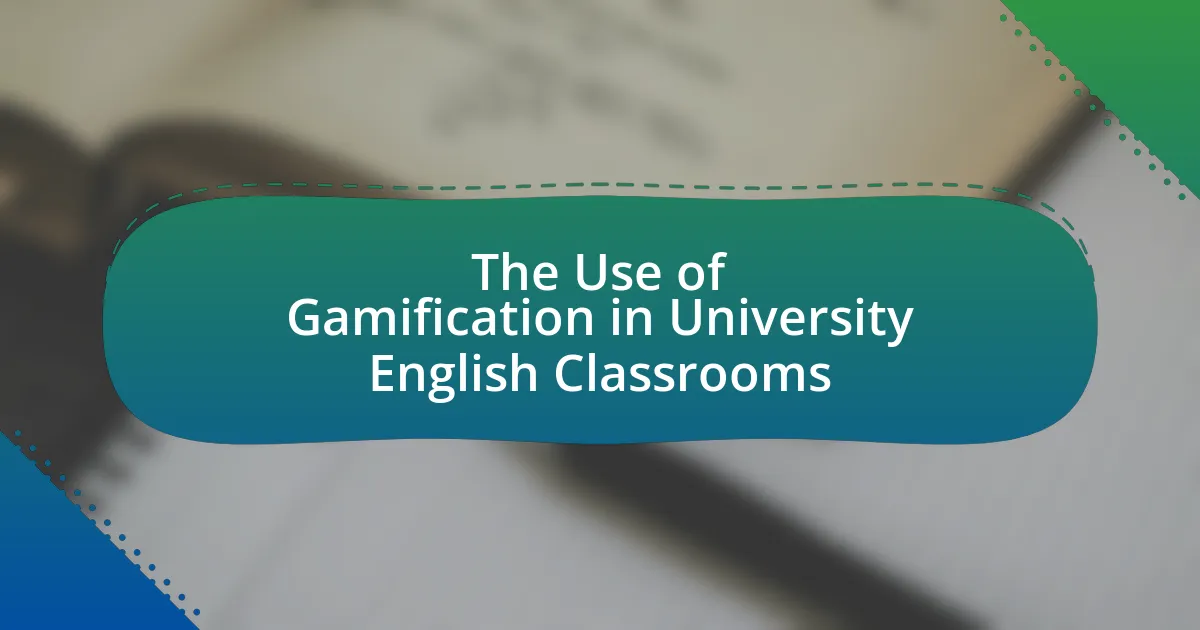Peer review in writing courses is a collaborative process where students evaluate each other’s work to provide constructive feedback, enhancing critical thinking and writing skills. This article explores how peer review fosters critical thinking by encouraging students to analyze arguments, identify biases, and reflect on their own writing. Key elements such as constructive feedback, diverse perspectives, and reflective practice are discussed, along with best practices for implementation and strategies to improve student engagement. Additionally, the article addresses challenges in peer review and emphasizes the importance of self-assessment and effective feedback techniques in developing critical thinking abilities among students.
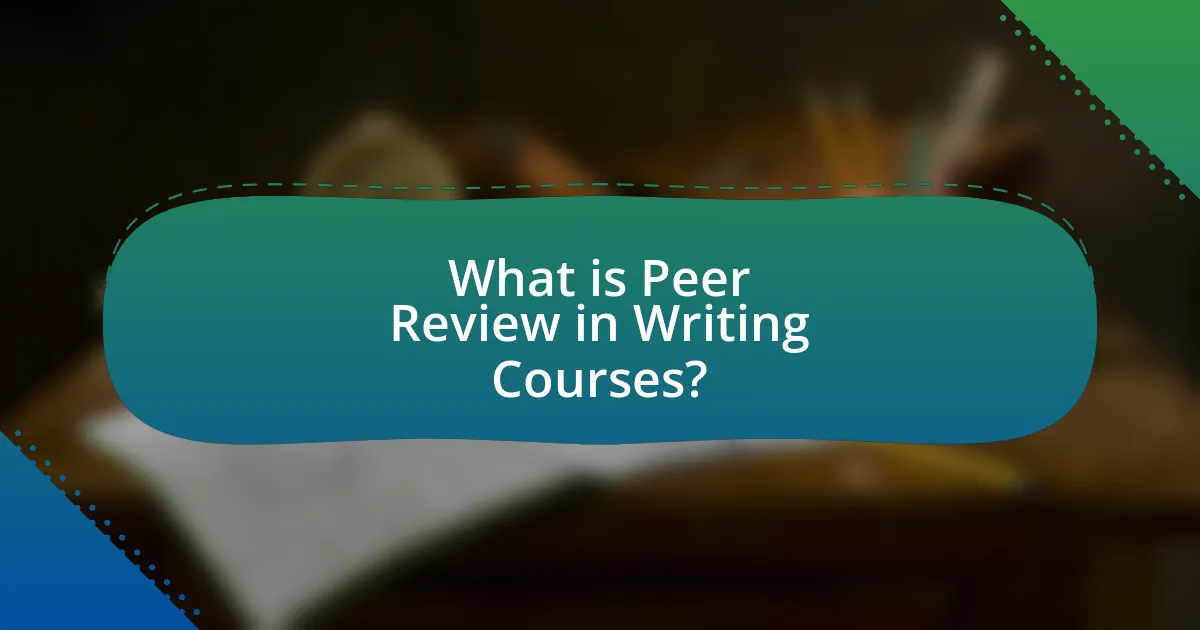
What is Peer Review in Writing Courses?
Peer review in writing courses is a process where students evaluate each other’s work to provide constructive feedback. This practice enhances critical thinking by encouraging students to analyze writing techniques, assess clarity, and identify strengths and weaknesses in their peers’ work. Research indicates that peer review not only improves writing skills but also fosters a deeper understanding of the writing process, as students engage in reflective thinking about their own writing while critiquing others.
How does Peer Review contribute to Critical Thinking?
Peer review enhances critical thinking by requiring individuals to evaluate and analyze the work of their peers, fostering deeper understanding and reflection. This process encourages reviewers to assess arguments, identify biases, and consider alternative perspectives, which are essential components of critical thinking. Research indicates that engaging in peer review not only improves the quality of feedback provided but also enhances the reviewer’s ability to think critically about their own work. A study published in the Journal of Educational Psychology found that students who participated in peer review demonstrated significant improvements in critical thinking skills compared to those who did not engage in such activities.
What are the key elements of Peer Review that enhance Critical Thinking?
The key elements of Peer Review that enhance Critical Thinking include constructive feedback, diverse perspectives, and reflective practice. Constructive feedback allows peers to critically assess each other’s work, identifying strengths and weaknesses, which fosters deeper analysis. Diverse perspectives introduce varying viewpoints, encouraging individuals to consider alternative arguments and enhancing their evaluative skills. Reflective practice, where reviewers contemplate their own understanding and biases, promotes self-awareness and critical evaluation of their thought processes. These elements collectively contribute to a more rigorous intellectual engagement, essential for developing critical thinking skills in writing courses.
How does Peer Review encourage self-reflection in writers?
Peer review encourages self-reflection in writers by providing constructive feedback that prompts them to critically evaluate their own work. When writers receive insights from peers, they are compelled to reconsider their arguments, clarity, and overall effectiveness. This process fosters a deeper understanding of their writing choices and encourages them to identify areas for improvement. Research indicates that peer feedback can lead to enhanced self-assessment skills, as writers learn to recognize their strengths and weaknesses through the lens of others’ perspectives.
Why is Peer Review important in Writing Education?
Peer review is important in writing education because it enhances critical thinking and improves writing skills through collaborative feedback. Engaging in peer review allows students to analyze their peers’ work, fostering a deeper understanding of writing conventions and argumentation. Research indicates that students who participate in peer review demonstrate greater improvement in their writing abilities, as they learn to identify strengths and weaknesses in both their own and others’ writing. This process not only cultivates analytical skills but also encourages a sense of community and accountability among students, leading to a more enriching educational experience.
What skills does Peer Review develop in students?
Peer review develops critical thinking, analytical skills, and effective communication in students. Through the process of evaluating peers’ work, students learn to assess arguments, identify strengths and weaknesses, and provide constructive feedback. This engagement enhances their ability to articulate their thoughts clearly and persuasively, as they must express their critiques in a coherent manner. Research indicates that peer review fosters deeper understanding and retention of material, as students actively engage with content rather than passively consuming it.
How does Peer Review foster collaboration among peers?
Peer review fosters collaboration among peers by creating a structured environment where individuals can share feedback and insights on each other’s work. This process encourages open communication and the exchange of ideas, as peers engage in discussions that enhance their understanding of the subject matter. Research indicates that peer review not only improves the quality of writing but also builds a sense of community among participants, as they collectively work towards refining their skills and knowledge. Studies show that collaborative feedback during peer review leads to increased motivation and accountability, further strengthening the collaborative dynamic.
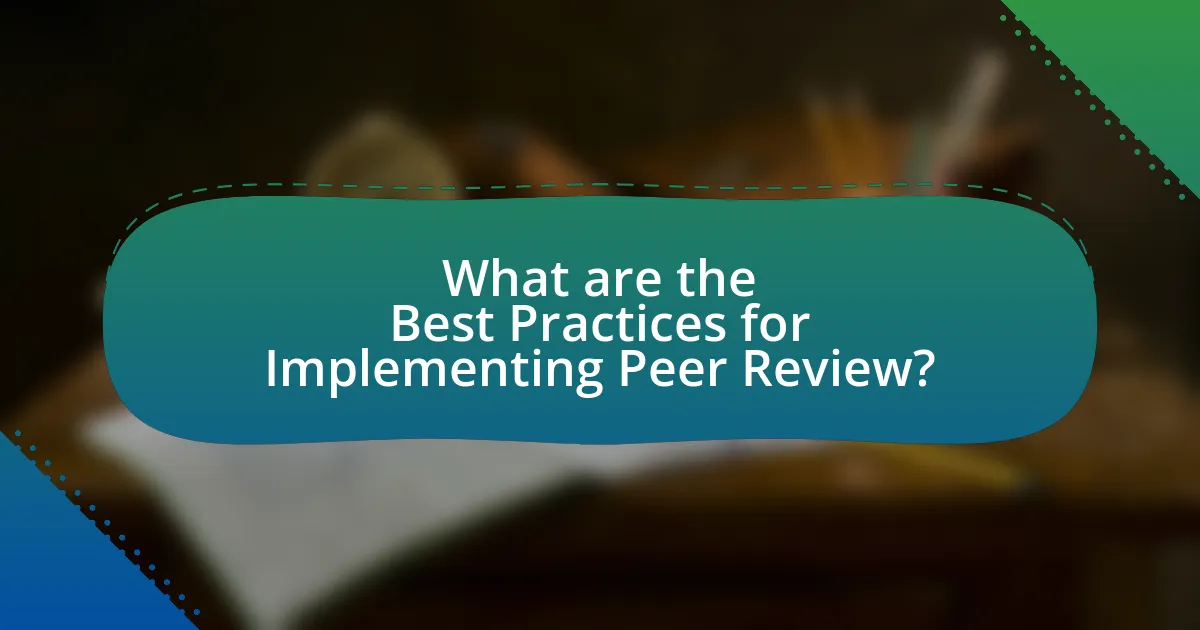
What are the Best Practices for Implementing Peer Review?
The best practices for implementing peer review include establishing clear guidelines, training participants, and providing structured feedback forms. Clear guidelines ensure that all participants understand the objectives and criteria for the review process, which enhances the quality of feedback. Training participants equips them with the skills necessary to evaluate work constructively and to receive criticism positively. Structured feedback forms facilitate focused and actionable comments, making it easier for authors to understand and apply the feedback. Research indicates that structured peer review processes can significantly improve the quality of student writing and critical thinking skills, as evidenced by studies showing that students who engage in peer review demonstrate higher levels of engagement and understanding of writing conventions.
How can instructors effectively introduce Peer Review to students?
Instructors can effectively introduce Peer Review to students by clearly explaining its purpose and benefits, such as enhancing critical thinking and improving writing skills. By providing structured guidelines and examples of effective feedback, instructors can help students understand how to evaluate their peers’ work constructively. Research indicates that students who engage in Peer Review develop a deeper understanding of writing conventions and critical analysis, as evidenced by a study published in the Journal of Educational Psychology, which found that students who participated in Peer Review showed significant improvement in their writing quality compared to those who did not.
What guidelines should be provided to ensure constructive feedback?
To ensure constructive feedback, guidelines should include specificity, focus on behavior rather than personal attributes, and provide actionable suggestions. Specific feedback helps the recipient understand exactly what aspects need improvement, while focusing on behavior maintains a positive tone and encourages growth. Actionable suggestions empower the recipient to make concrete changes. Research indicates that feedback that is clear and focused on specific behaviors leads to better learning outcomes, as shown in studies by Hattie and Timperley (2007), which emphasize the importance of feedback in enhancing student performance.
How can technology facilitate the Peer Review process?
Technology can facilitate the Peer Review process by providing platforms that streamline communication and feedback among reviewers and authors. Online tools such as collaborative writing software and dedicated peer review systems enable real-time editing, commenting, and tracking of revisions, which enhances the efficiency of the review process. For instance, platforms like Google Docs allow multiple users to provide feedback simultaneously, ensuring that authors receive diverse perspectives quickly. Additionally, automated systems can match reviewers with manuscripts based on expertise, improving the quality of feedback. Research indicates that technology-enhanced peer review can lead to higher engagement and more constructive criticism, ultimately fostering critical thinking in writing courses.
What challenges might arise during Peer Review?
Challenges during peer review include bias, lack of expertise, and time constraints. Bias can manifest when reviewers allow personal opinions to influence their evaluations, potentially skewing the feedback provided. Lack of expertise occurs when reviewers are not sufficiently knowledgeable about the subject matter, leading to inadequate or irrelevant critiques. Time constraints often pressure reviewers to rush through evaluations, resulting in superficial feedback that fails to enhance the quality of the work being reviewed. These challenges can undermine the effectiveness of peer review in fostering critical thinking in writing courses.
How can instructors address common issues in Peer Review sessions?
Instructors can address common issues in Peer Review sessions by establishing clear guidelines and expectations for feedback. Clear instructions help participants understand the objectives of the review process, which can reduce confusion and enhance the quality of critiques. Research indicates that structured peer review processes lead to improved student engagement and learning outcomes, as evidenced by a study published in the Journal of Educational Psychology, which found that students who received explicit criteria for peer feedback demonstrated higher levels of critical thinking and writing skills. Additionally, instructors can facilitate training sessions on providing constructive feedback, ensuring that students are equipped with the necessary skills to evaluate their peers effectively.
What strategies can be employed to improve student engagement in Peer Review?
To improve student engagement in Peer Review, instructors can implement structured guidelines and provide training on effective feedback techniques. Structured guidelines help students understand expectations and the importance of their contributions, while training enhances their ability to give constructive criticism. Research indicates that when students receive clear instructions and practice in providing feedback, their engagement levels increase significantly, as evidenced by a study published in the Journal of Educational Psychology, which found that structured peer review processes led to higher student satisfaction and participation rates.
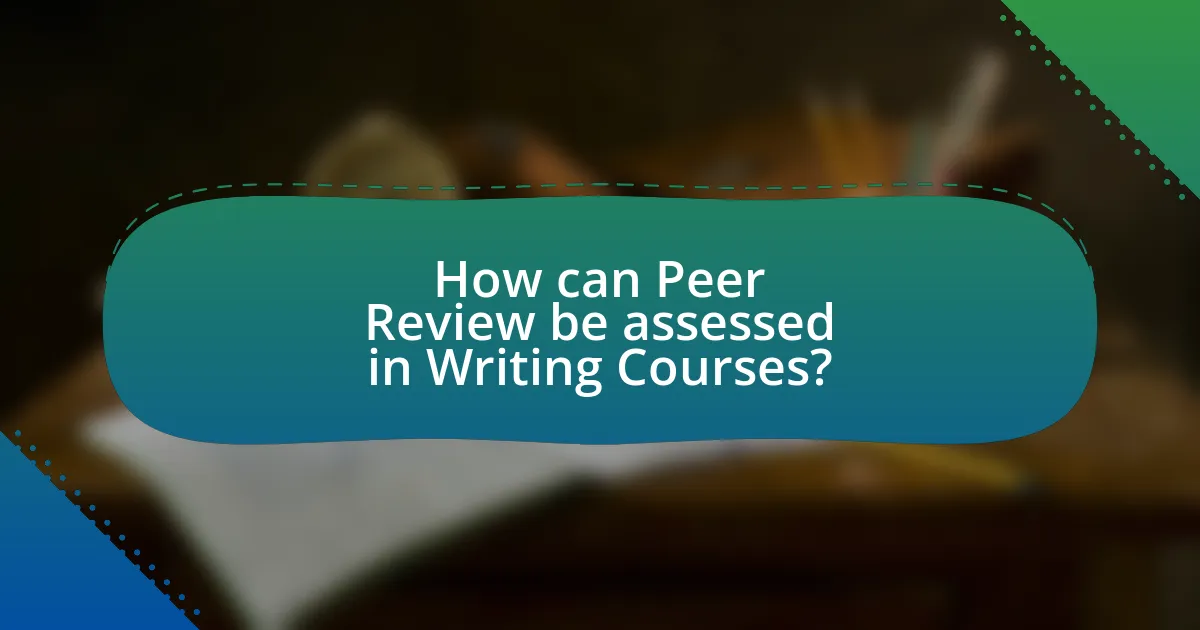
How can Peer Review be assessed in Writing Courses?
Peer review in writing courses can be assessed through structured rubrics that evaluate specific criteria such as clarity, organization, and argument strength. These rubrics provide a standardized method for students to give and receive feedback, ensuring that assessments are objective and focused on key writing elements. Research indicates that using detailed rubrics enhances the reliability of peer assessments, as evidenced by a study published in the Journal of Writing Research, which found that students who utilized rubrics demonstrated a 20% improvement in their ability to critique peer work effectively. This structured approach not only fosters critical thinking but also encourages students to engage deeply with the writing process, leading to improved writing skills overall.
What criteria should be used to evaluate Peer Review contributions?
The criteria used to evaluate Peer Review contributions should include clarity, relevance, constructiveness, and adherence to guidelines. Clarity ensures that feedback is understandable and specific, allowing the author to grasp the points made. Relevance assesses whether the feedback addresses the key aspects of the work, such as argument strength and evidence quality. Constructiveness evaluates the ability to provide actionable suggestions for improvement rather than merely criticism. Adherence to guidelines checks if the reviewer follows the established criteria for the peer review process, ensuring consistency and fairness. These criteria are essential for fostering critical thinking and enhancing the quality of writing in educational settings.
How can feedback from Peer Review be integrated into final assessments?
Feedback from Peer Review can be integrated into final assessments by systematically incorporating peer evaluations into the grading criteria. This approach allows instructors to assess not only the final product but also the development process, encouraging students to reflect on and apply constructive criticism received from peers. Research indicates that students who engage in peer review demonstrate improved writing skills and critical thinking abilities, as they learn to evaluate their work and that of others critically (Topping, 1998). By weighting peer feedback as a component of the final grade, educators can promote accountability and enhance learning outcomes, ensuring that students value the feedback process as part of their academic growth.
What role does self-assessment play in the Peer Review process?
Self-assessment plays a crucial role in the Peer Review process by enabling individuals to critically evaluate their own work before receiving feedback from peers. This reflective practice encourages authors to identify strengths and weaknesses in their writing, fostering a deeper understanding of their own thought processes and writing techniques. Research indicates that self-assessment enhances critical thinking skills, as it requires individuals to analyze their work against established criteria, leading to improved writing quality and greater receptiveness to peer feedback. Studies have shown that students who engage in self-assessment demonstrate higher levels of engagement and ownership over their learning, which ultimately contributes to a more effective Peer Review process.
What are some practical tips for maximizing the effectiveness of Peer Review?
To maximize the effectiveness of peer review, establish clear guidelines and criteria for evaluation. Clear guidelines help reviewers understand expectations, leading to more focused and constructive feedback. Research indicates that structured peer review processes enhance the quality of feedback, as seen in studies where students provided more specific critiques when given detailed rubrics (Topping, 1998). Additionally, training students on how to give and receive feedback fosters a more productive peer review environment, as it equips them with the necessary skills to engage critically with each other’s work. Implementing these strategies can significantly improve the outcomes of peer review in writing courses.
How can students be trained to give and receive feedback effectively?
Students can be trained to give and receive feedback effectively through structured peer review processes that emphasize clear communication and constructive criticism. Implementing guidelines for feedback, such as focusing on specific aspects of the work, using “I” statements to express personal perspectives, and encouraging questions rather than statements, fosters a supportive environment. Research indicates that peer feedback enhances critical thinking skills; for instance, a study by Topping (1998) found that students who engage in peer assessment demonstrate improved analytical skills and greater understanding of evaluation criteria. Additionally, training sessions that include role-playing and practice scenarios can help students develop the necessary skills to articulate their thoughts clearly and receive feedback with an open mindset.
What resources are available to support Peer Review in writing courses?
Resources available to support peer review in writing courses include online platforms, instructional guides, and workshops. Online platforms such as Peergrade and Turnitin facilitate structured peer review processes, allowing students to give and receive feedback efficiently. Instructional guides, like those from the Writing Center at the University of North Carolina, provide strategies for effective peer review, emphasizing criteria for constructive criticism. Workshops conducted by educational institutions often focus on training students in peer review techniques, enhancing their critical thinking and writing skills. These resources collectively enhance the peer review experience, fostering a collaborative learning environment.
